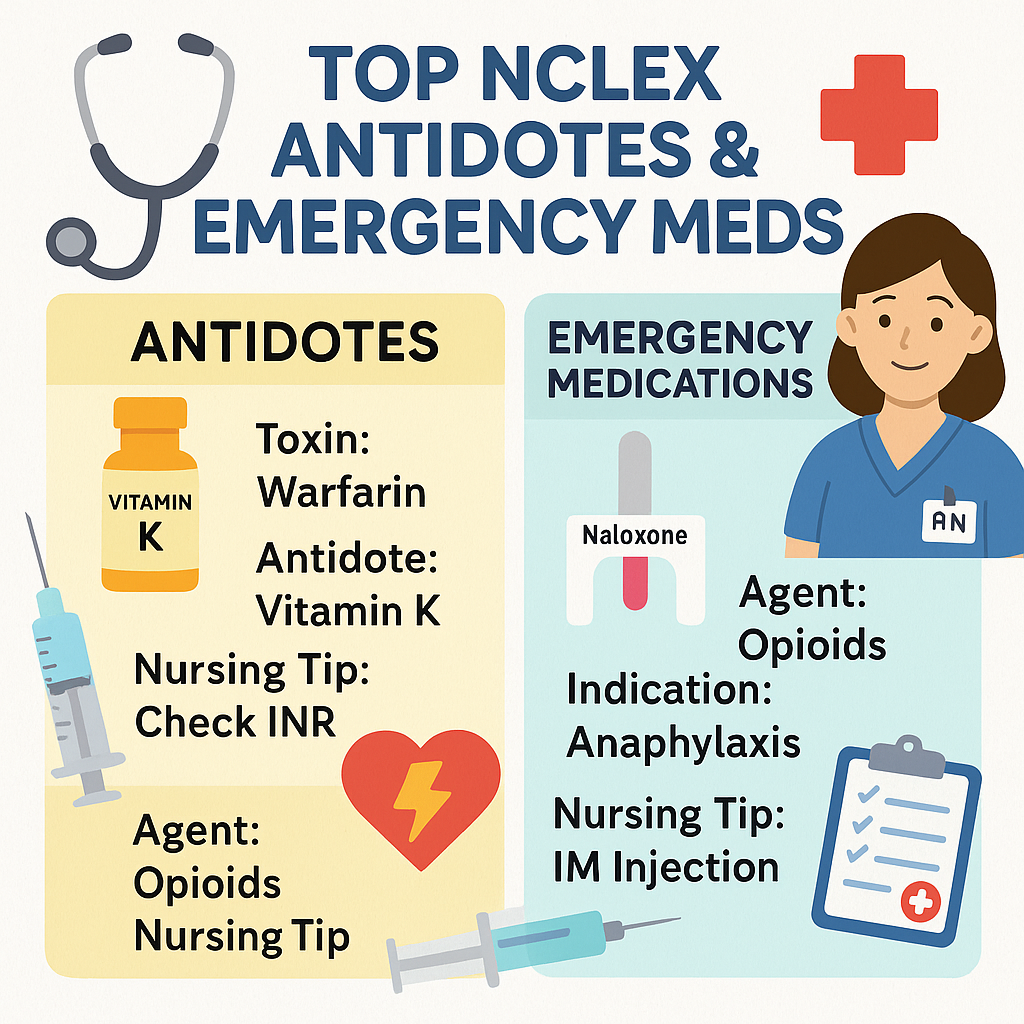When it comes to the NCLEX, certain medication topics show up again and again—especially antidotes and emergency drugs. Whether you’re a nursing student, a new RN nurse, or reviewing material in a nursing bundle, knowing these meds cold can make all the difference.
This article is your quick-reference guide to the most common antidotes and life-saving emergency drugs you need to remember.
🧪 What Is an Antidote?
An antidote is a medication or substance given to reverse the effects of a poison or overdose. Registered nurses (RNs) are often the first line of defense in recognizing symptoms of overdose and must act fast.
💉 Most Common Antidotes on the NCLEX
| Toxin / Overdose | Antidote | Nursing Notes |
|---|---|---|
| Opioids (morphine, heroin) | Naloxone (Narcan) | Watch for return of respiratory function |
| Acetaminophen (Tylenol) | Acetylcysteine (Mucomyst) | Must be given within 8–10 hrs of overdose |
| Warfarin (Coumadin) | Vitamin K | Monitor INR levels |
| Heparin | Protamine sulfate | Monitor aPTT, bleeding |
| Benzodiazepines (e.g., lorazepam, diazepam) | Flumazenil (Romazicon) | Watch for seizures; use cautiously |
| Magnesium sulfate overdose | Calcium gluconate | Monitor reflexes, respirations, heart rate |
| Iron overdose | Deferoxamine | Watch for hypotension, red urine |
| Digoxin toxicity | Digibind (Digoxin immune Fab) | Watch for visual changes, bradycardia |
| Beta-blockers overdose | Glucagon | Increases heart rate and blood sugar |
| Insulin overdose | Glucose (D50), Glucagon | Treat hypoglycemia; check blood sugar levels |
These antidotes are NCLEX favorites, so make sure to include them in your nursing bundle review!
🆘 Emergency Medications Every RN Nurse Should Know
In urgent situations, fast drug administration saves lives. These are critical medications nurses must be prepared to administer:
1. Epinephrine
- Used in: Anaphylaxis, cardiac arrest, severe asthma
- Nursing Tip: IM for allergic reactions, IV during CPR
- Watch for: Increased BP, HR, and anxiety
2. Atropine
- Used in: Bradycardia
- Nursing Tip: Monitor HR closely, especially in cardiac patients
- Watch for dry mouth, blurred vision
3. Amiodarone
- Used in: Ventricular arrhythmias
- Nursing Tip: Can cause pulmonary toxicity with long-term use
4. Adenosine
- Used in: Supraventricular tachycardia (SVT)
- Nursing Tip: Rapid IV push with flush; patient may feel chest pain briefly
5. Nitroglycerin
- Used in: Chest pain (angina)
- Nursing Tip: Monitor BP (can cause hypotension), assess for headache
6. Sodium bicarbonate
- Used in: Metabolic acidosis, certain drug overdoses (e.g., tricyclics)
- Nursing Tip: Watch for signs of alkalosis
👩⚕️ NCLEX Tips for Antidotes and Emergencies
- Prioritize ABCs: Airway, Breathing, Circulation
- Know reversal agents: Especially for high-alert meds like anticoagulants and opioids
- Know expected outcomes: e.g., Narcan restores breathing
- Always monitor vitals before/after giving emergency meds
- For NCLEX, expect select all that apply (SATA) questions involving multiple correct antidotes or actions.
📚 Example NCLEX Practice Question
Q: A patient received an overdose of morphine. Which medication should the nurse prepare to administer?
A. Vitamin K
B. Protamine sulfate
C. Naloxone
D. Acetylcysteine
✅ Correct Answer: C – Naloxone
(This reverses opioid effects like respiratory depression.)
🧠 Mnemonic to Remember Common Antidotes
“ON A Very Bad Day, Dumb Students Grab Help!”
O – Opioids → Naloxone
A – Acetaminophen → Acetylcysteine
V – Valium/Benzos → Flumazenil
B – Beta-blockers → Glucagon
D – Digoxin → Digibind
S – Sulfate (Magnesium) → Calcium gluconate
G – Glucose (for insulin overdose)
H – Heparin → Protamine sulfate

